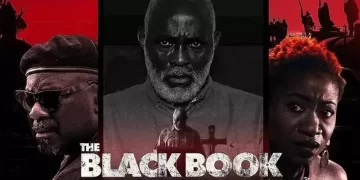Far From Home, Netflix’s Nigerian Elite or Blood & Water (if you will), directed by Kayode Kasum (Obara’M), offers a vicarious glimpse into the life of a talented though underprivileged artist. Ishaya (Mike Afolarin), our hard-knocked hustler-Caravaggio, is extremely motivated and intent on attaining ‘his dreams,’ whatever those may be, under any means necessary. This leads him to infiltrate Nigeria’s most exclusive and elite—ha!—secondary school, subsequently fostering quite a bit of entertaining misadventures like drug dealing, kidnapping and other stupid decisions; the very foundation of television.
I said ‘vicarious’ glimpse because the purpose of shows like these, whether or not the creators are aware, is to offer us peasants a close-screen experience of being young, beautiful, rich, and some kind of main character. In a lot of ways, this is the actual purpose of visual art: escapism. Ishaya likewise endeavours to escape the cards he was dealt by becoming an artist, just like his father, and dreams of flying to London for an art grant presided over by his favourite painter, a chap named Essien.
Getting the grant is no problem; it, in fact, happens before the pilot starts. Ishaya’s real goal is to get the required funds to haul him and his brushes to the UK. Thus begins a convoluted spiral down a rabbit hole of incongruous genre clichés and a little bit of classic Nollywood in there as well. Fancy high school, rich kids, drug dealers, mistresses, mistresses that usurp the drug dealers; Far From Home clearly has the desire to be everything across the tube.
If one remembers back to a time when school politics was all they could fret about, one remembers mostly a world divided in factions. According to sensibility, background and interests, you joined one of these factions and learned that the individuals you met in these groups were, indeed, individuals. Ditto with YA high school dramas. The very first, very obvious piece of insight or theme a writer’s room should have on their whiteboard, the lowest hanging fruit is their characters’ arcs: seeping through the templates of each character from the beginning of the show and gradually building them up to recognisable individuals.
Since Far From Home is purportedly about an artist, ’tis only fitting to describe it in comparison to some art. In this, it’s a lot like that sketch of the horse that starts out prodigiously at the head and neck, but by the time we get to the belly and hind legs, it could belong to any third-grader phoned-in school work. Ishaya is so vivid in the pilot I almost started identifying with him. Along the way, he morphs into a stock character combination from different factions and genres. He’s not the only person who suffers this fate. There is not one individual in this cast of characters. It’s as if the writers didn’t attend high school. I’m not saying that because of the quality on display here but because they seemed to forget all the little different combinations of nuances that can exist in someone that somehow come together and exude one unifying stereotype. Different, but alike. It’s as if they were writing from the outside looking in, without any access to their own creations.
The actors, of course, had no choice but to play it just like that, and they all seem to be having fun doing it, or at least those with fun stereotypes to play. There’s the poor actor who had to play an inept rich kid loser who, believe it or not, blackmails the popular guy at school about something or other, and his take is, “You have to be my best friend.” It’s almost insulting to real high school students. There’s the very talented Bucci Frankin, who plays the drug dealer’s lieutenant referred to as Government. And Afolarin, as Ishaya, does give a consistently dependable performance, up until the scripts change his personality in a bid to quickly wrap things up.
But stereotypes can be satisfying in and of themselves if they’re interesting or show us something in a new way. I would have given this three stars if I’d seen the first three episodes and stopped there. The last half of the season is rushed, sometimes beyond comprehension. People who were in trouble at the end of the previous episode reign at the top at the beginning of the next. You have to confirm that, yes, this is episode five you’re watching. It wasn’t a very complex premise they were working with, and the show’s laziness attempted to make it even less complex, as a result, achieving nothing at all.
Far From Home is now streaming on Netflix.
Enjoyed this article?
To receive the latest updates from Sinema Focus directly to your inbox, subscribe now.











